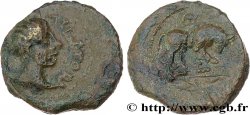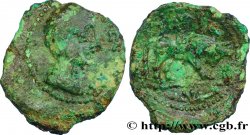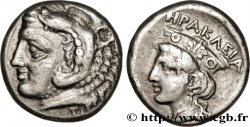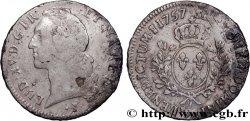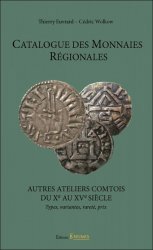v45_0922 - GALLIA - SANTONES / MID-WESTERN, Unspecified Denier SANTONOS à l’annelet perlé
MONNAIES 45 (2010)
Starting price : 350.00 €
Estimate : 500.00 €
unsold lot
Starting price : 350.00 €
Estimate : 500.00 €
unsold lot
Type : Denier SANTONOS à l’annelet perlé
Date: c. 60-50 AC.
Metal : silver
Diameter : 14,50 mm
Orientation dies : 3 h.
Weight : 1,71 g.
Rarity : R3
Coments on the condition:
Monnaie frappée sur un flan relativement large et un peu ovale. Droit de qualité avec la tête et la légende complètes. Revers légèrement décentré mais néanmoins complet. Fine patine irisée sur un métal agréable mais légèrement poreux en surface
Catalogue references :
Predigree :
Cet exemplaire provient de la collection A.C.G. (a été acheté chez Maison Florange) puis de MONNAIES 38, n° 1560
Obverse
Obverse legend : SANTONOS.
Obverse description : Tête casquée à gauche, légende devant le visage ; grènetis.
Reverse
Reverse legend : ANÉPIGRAPHE.
Reverse description : Cheval bridé bondissant à droite ; dessous, un cercle perlé pointé ; grènetis.
Commentary
Denier de qualité avec la légende SANTONOS complète devant le visage, avec les lettres ANT ligaturées.
Ce type de denier est plus rare que celui à légende ARIVOS au droit et SANTONO au revers (LT 4525).
Pour cette classe II, nous avons SANTONOS au droit tandis que le revers est anépigraphe (LT. 4520).
Il convient de distinguer deux variétés ; la première (DT. 3266) avec un annelet perlé entre les jambes du cheval, et la seconde (DT. 3267) avec un pentagramme à la place et une esse au-dessus du dos. D’après les exemplaire pointés et passés en vente, la proportion semble être d’un denier de la classe II pour vingt deniers de la classe I.
Quality denarius with the full legend SANTONOS in front of the face, with the letters ANT ligatured. This type of denarius is rarer than the one with the legend ARIVOS on the obverse and SANTONO on the reverse (LT 4525). For this class II, we have SANTONOS on the obverse while the reverse is anepigraphic (LT. 4520). Two varieties should be distinguished; the first (DT. 3266) with a pearl ringlet between the horse's legs, and the second (DT. 3267) with a pentagram in place and an esse above the back. According to the examples marked and sold, the proportion seems to be one denarius of class II for twenty denarii of class I
Ce type de denier est plus rare que celui à légende ARIVOS au droit et SANTONO au revers (LT 4525).
Pour cette classe II, nous avons SANTONOS au droit tandis que le revers est anépigraphe (LT. 4520).
Il convient de distinguer deux variétés ; la première (DT. 3266) avec un annelet perlé entre les jambes du cheval, et la seconde (DT. 3267) avec un pentagramme à la place et une esse au-dessus du dos. D’après les exemplaire pointés et passés en vente, la proportion semble être d’un denier de la classe II pour vingt deniers de la classe I.
Quality denarius with the full legend SANTONOS in front of the face, with the letters ANT ligatured. This type of denarius is rarer than the one with the legend ARIVOS on the obverse and SANTONO on the reverse (LT 4525). For this class II, we have SANTONOS on the obverse while the reverse is anepigraphic (LT. 4520). Two varieties should be distinguished; the first (DT. 3266) with a pearl ringlet between the horse's legs, and the second (DT. 3267) with a pentagram in place and an esse above the back. According to the examples marked and sold, the proportion seems to be one denarius of class II for twenty denarii of class I








 Report a mistake
Report a mistake Print the page
Print the page Share my selection
Share my selection Ask a question
Ask a question Consign / sell
Consign / sell
 Full data
Full data


